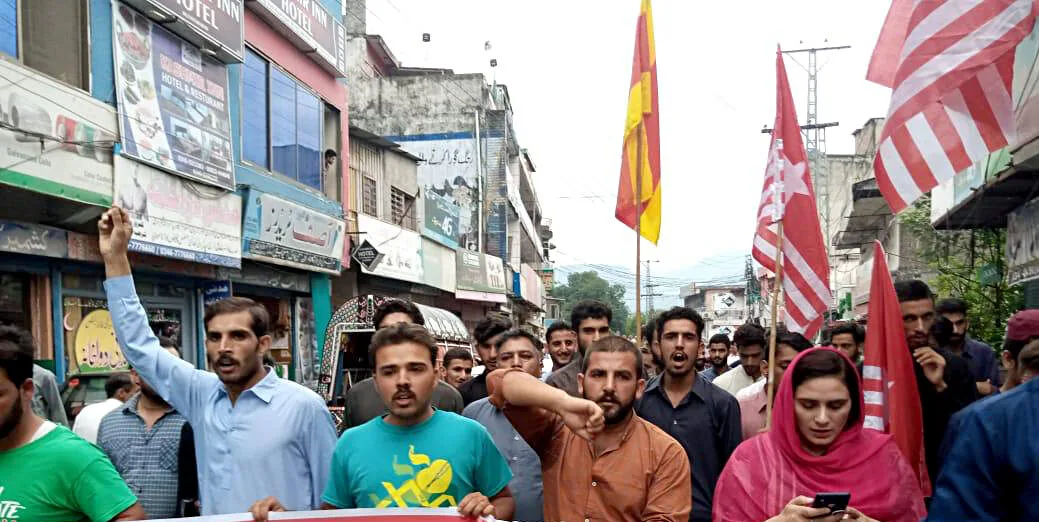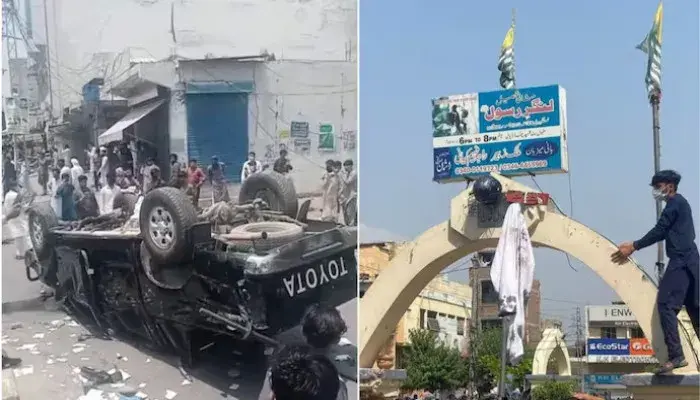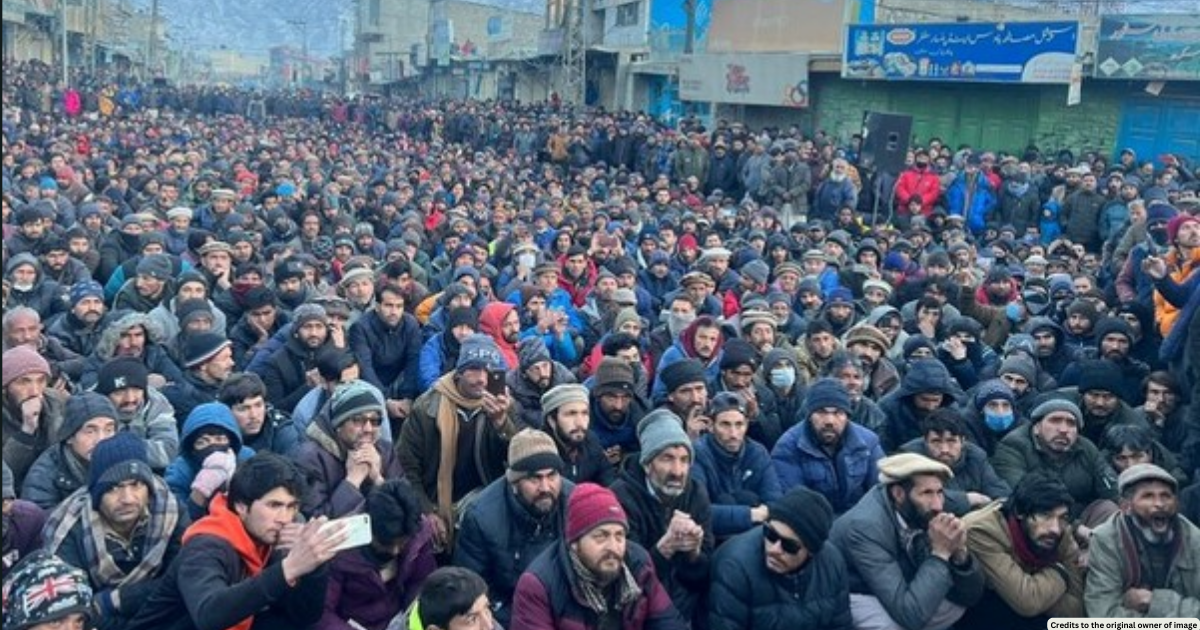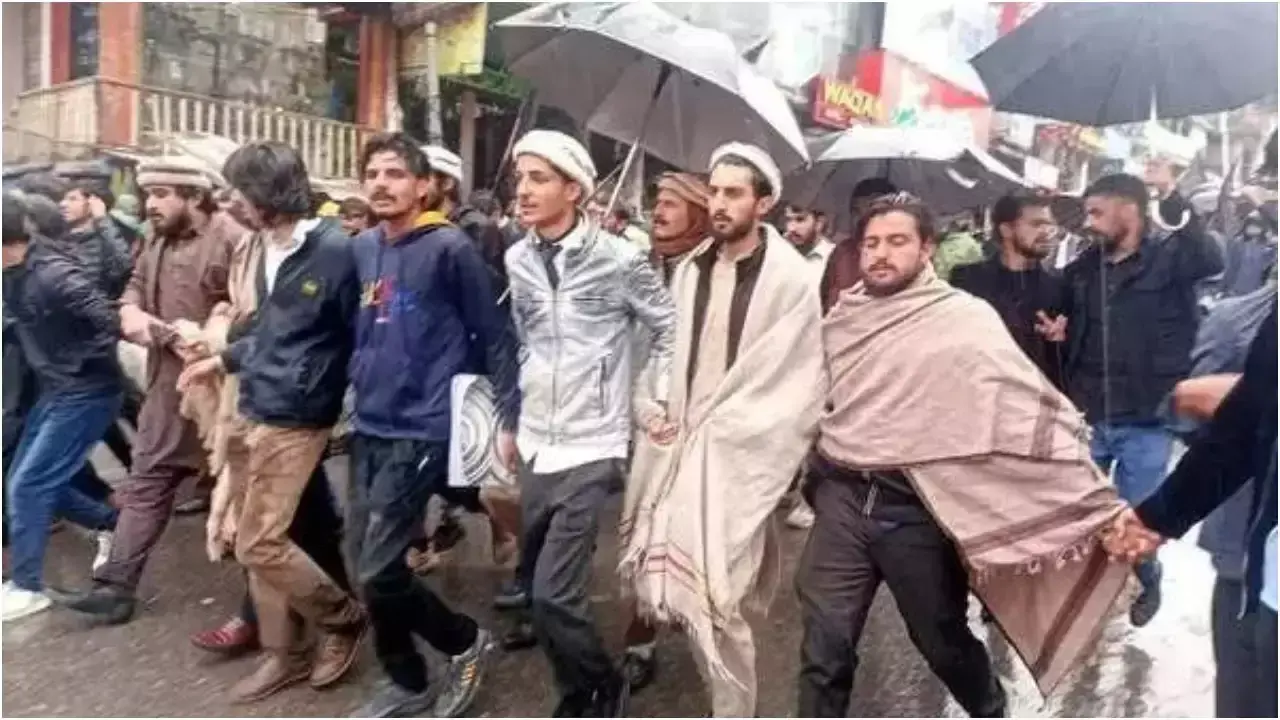In Pakistan occupied Kashmir (POK), a massive wave of protest has emerged with throngs taking to the streets. These demonstrations, inflamed by grievances against seemingly unjustified taxes imposed by the Pakistani administration, have brought together a broad cross-section of society. From pupils to labor coalitions and enterprises, a coalesced front has materialized, rallying for the nullification of these burdensome levies and a shift towards a more equitable economic paradigm.
Despite the peaceful quality of the protests, the atmosphere remains thick with slogans and signs alike echoing the demand for fairness and an end to fiscal subjugation. Students have led vocal marches, artfully woven rhetoric calling leaders to account. Meanwhile, in remote mountain villages, elders discuss through late nights how to support the movement from afar. United in frustration, people question how long this oppression may last before change fully comes.

Overview of the Unfair Taxes Imposed by Pakistan
The root cause of all this unrest is the newly imposed taxes by the Pakistani government. Most notably, these taxes pertain to essential goods and services’ rates. As PoK is already overwhelmed by economic struggles, these new taxes have been the final straw for many, tipping them over the edge and pushing them out into the streets. The Pakistani government made the decision to levy these taxes without speaking to the local populace and their representatives and without their consent.
This was a direct and systemic attack on the economic well-being of this area’s residents, and they had every right to be indignant. These taxes were voracious and unfair, as they were a lethal blow not to just the local populace but to the economic situation in there. Many of the danatoto PoK small business owners were unable to cope with this new reality, and many more were forced to suspend their operations finally. Farmers have also been hit hard, having to shut down their businesses at an astonishing rate due to the unviability of conducting business under these new tax rates. This current state of economic affairs leaves many people with no other choice but to protest the situation.
Causes and Reasons Behind the Protests
Furthermore, these taxes have been imposed at a time when PoK is already reeling under severe economic conditions. The region has high unemployment, low access to even basic amenities, and poor infrastructure development for decades. The so-called new taxes have amounted to existing grievances and have triggered pent up dissatisfaction, now being expressed through mass agitations. Therefore, it is not just about taxes; it is a movement for getting recognition and respect and asserting rights.
Residents in PoK are unhappy with the Pakistani government, which, they feel, has given them little to any voice in their policies. The decision-making process is highly contested, and the people are unhappy about the lack of transparency in governance. They have clearly developed suspicion and lost trust in the government, and this is as much a movement for economic justice as self-determination.
PoK: Key Players and Leaders in the Protest Movement
The entire movement is very diverse, and there are certain leaders and organizations that have become the face and voice of the protest. Among the most prominent ones are students, frustrated by the difficult task of finding a job after high school with the region’s economy in tatters. They have proven to be the most vocal group, taking to the streets and marching against the new policies. Workers’ unions have also been very vocal, organizing their members and even calling for a strike.
Finally, business owners from small shopkeepers to industrial magnates were united in their opposition to the new taxes on businesses, as they believe that additional taxes will bankrupt their enterprises. All of these groups were able to become the face of the protest movement, and their leaders managed to turn the general dissatisfaction into organized demonstrations. This was key to keeping the protests peaceful, as otherwise they could turn into violent riots.
Impact of the Protests on the Local Economy
While the protests have been aimed to end the economic suffering of PoK’s residents, the initiative has caused an immediate impact on the region’s economy. Since the protesters repeatedly go on strikes or daily demonstrations, the region’s daily life and business operations have also suffered a short-term economic loss.
Nevertheless, the majority of the content considers such consequences to be a required toll that needs to be paid should the PoK residents be provided with long-term economic justice and development. Additionally, the protests have also uncovered PoK’s potential as an economically vibrant area in need of investment and development, rather than higher taxes. As a result, the movement aspires to change the PoK; residents’ economic struggles will result into more jobs, improved infrastructure, and living standards.

Response from the Pakistani Government
The Pakistani government has, at least initially, viewed the protests with some scepticism. Initially declaring that the protests were too marginal to reflect the broader public discontent, the authorities had to recalibrate as the people’s and territory’s support quickly grew. While there have been indications of a potential dialogue between the protest leaders and the authorities, there has not yet been any real action or compromise observed in relation to the government’s position.
Even beyond the problem of the pace of response, however, lies a more fundamental problem questioning the Pakistani government’s policy of PoK governance. The PoK government has been criticized for deciding policies independently of the residents’ interests, leading to such mass protests. The current situation is an opportunity for Pakistan to reform its attitude towards the area.
International Reactions and Support for the Protesters
The protests in PoK have garnered international attention, with human rights organizations and foreign governments expressing concern over the situation. There has been a call for the Pakistani government to respect the rights of the protesters and engage in meaningful dialogue to address their grievances. International media coverage has also played a role in amplifying the protesters’ voices, bringing their struggle to a global audience.
This international support has been a source of encouragement for the protesters, reinforcing their resolve and highlighting the global significance of their fight for economic justice and self-determination. It has also put pressure on the Pakistani government to respond more effectively to the situation, with the potential for international scrutiny to impact Pakistan’s relations and standing on the world stage.
Media Coverage and Social Media Impact of the Protests
The role of media and social media in the protests cannot be overstated. Local and international news outlets have covered the demonstrations extensively, providing a platform for the protesters’ demands to be heard. Social media, in particular, has been a crucial tool for organizing and mobilizing, allowing for real-time coordination and the sharing of information.
Social media has also enabled the protesters to bypass traditional media channels, which may be subject to censorship or biases, directly reaching a global audience. The use of hashtags, live streaming, and online petitions has engaged international supporters, creating a digital solidarity movement that extends far beyond PoK’s borders.
Future Implications and Potential Outcomes of the Protests
The protests in PoK stand at a critical juncture. Their outcome could have far-reaching implications, not just for the economic policies in question but for the relationship between PoK and the Pakistani government. A successful negotiation that leads to the repeal or adjustment of the taxes could set a precedent for more participatory governance in the region.
Conversely, a failure to address the protesters’ demands could lead to increased unrest and potentially destabilize the region further. It is in the interest of all parties to find a solution that acknowledges the legitimate grievances of PoK’s residents while laying the groundwork for sustainable economic development.

Call to Action for Supporting the Protesters
The protests in PoK are a manifestation of a population pushed to the edge by economic policies that they see as unfair and oppressive. Their struggle is not just about taxes; it is about dignity, rights, and the future of their region. Supporting the protesters, whether through raising awareness, advocating for international intervention, or expressing solidarity, is crucial in their fight for justice.
The international community must stand with the people of PoK, recognizing their right to protest and demanding that their voices be heard. Only through meaningful dialogue and concrete actions can the current crisis be resolved, paving the way for a fairer, more prosperous future for PoK. If you found this article insightful and are interested in exploring more diverse topics, please consider reading our article about Saffron Risotto. It’s not just a recipe—it’s a journey through culture, history, and the art of cooking.

